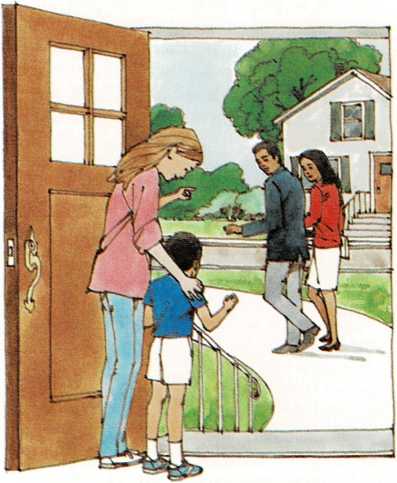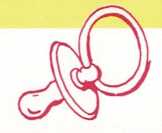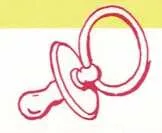Choosing a baby sitter
By Stella Chess, M.D.
Parents and children should occasionally spend time apart from each
other. Parents should be able to enjoy an evening out, or a few days
away from home, free from the demands made on them by their child. And a
young child needs to learn to accept the temporary absence of parents
without fear of being rejected or deserted. But this is possible only
when you are completely at ease, confident that your child is being
looked after by a friendly, efficient, and trustworthy baby sitter.

A friendly, efficient baby sitter can make parents and children feel
at ease.
When you place your child in the care of a baby sitter, you should be as
certain as possible that the sitter is fully able to assume
responsibility for the safety and needs of your child. Whether the baby
sitter is an adult or a teen-ager, and is needed for a few hours or a
few days at a time, it is important that you choose the sitter
carefully.
If you do not already know your prospective baby sitter, you should be
certain to get a recommendation from someone whose judgment you trust.
Depending on your child’s age and the length of time you expect to be
away, you will expect the baby sitter to have special qualifications.
There are many things you will want to know about any baby sitter you
engage.
■ Does the sitter like and understand children?
Do children like and respect the sitter?
Is the person an experienced sitter?
How will the sitter react to an emergency? ■ Is the sitter
physically and mentally healthy?Is the baby sitter clean and neat?
Are the sitter’s morals and conduct acceptable?
from gossiping?
A competent sitter should have little or no difficulty making your child
feel at ease. But no child, with the possible exception of a tiny
infant, should be expected to accept the care of a complete stranger
without some objection. It is, therefore, a good idea to invite the
sitter to your home so that you, the sitter, and your child can get to
know each other. While the sitter is in your home,
perform some activity in your child’s daily routine such as playing,
feeding, or dressing the child so that you and the child can begin to
establish a friendly, personal relationship with the sitter.
If such an opportunity is not possible, arrange to have the sitter
arrive early the first time. If you show that you like and trust the
sitter, your child will be quick to sense this. The child can usually be
counted on to relax and enjoy the quiet, pleasant atmosphere created by
friendly conversation. Hurried, last-minute warnings and instructions to
the sitter are likely to leave the child less relaxed.
During the sitter’s first visit to your home, point out all exits, and
special hazards such as electric heaters, electric outlets, open stairs,
or swinging doors. Demonstrate how thermostats and other temperature
regulators are operated. Show the sitter where to find a flashlight in
case of electric power failure, and give instructions for the use of any
appliances that the sitter may need while in your home.
Show the sitter where extra supplies of food, clothing, bed linen, and
diapers are kept; where first-aid supplies can be found; and where you
keep your permanent list of names and telephone numbers of people to
call in an emergency. This list should include the name and telephone
number of your family doctor (as well as the name of an alternate doctor
to call if your family doctor is not available), the names and telephone
numbers of several close neighbors, and the telephone numbers of the
police and fire departments. Be sure to give the sitter the name and
telephone number where you can be reached while you are away.
A baby sitter will do a much better job of caring for your child if you
explain any special habits and problems your child has. Tell the sitter
if your child is a restless sleeper, cries while asleep, sleeps with a
favorite toy or blanket, or has to be awakened at a certain time to go
to the toilet.
It is helpful for your sitter to know which books, stories, and records
are your child’s favorites. Sometimes a familiar song or story will
comfort a child who misses the parents.
When a sitter is to supervise bedtime for children of varying ages, you
should leave a
list of their bedtimes. You should also tell the sitter what your child
may have to eat or drink before bedtime. If the child is an infant, be
sure to make enough formula to last the time you are away, and show the
sitter how to heat and feed it to the baby.
To make the sitter feel more at ease, point out what foods she or he can
eat and what other privileges she or he can take while in your home.
When a sitter is to take over your household for several days, you
should leave a detailed list of your child’s activities, duties, and
privileges. The sitter should know whether you permit your child to have
friends in after school, how many may visit at a time, and where they
may play. If your child is required to wear special clothing when
outdoors, the sitter should be informed. Also, tell the sitter if
certain television programs are not permitted and what rules you expect
your child to follow.
If you choose a baby sitter with care, and if parents and baby sitters
respect the obligations and responsibilities each has to the other and
to the child, then everyone concerned can be sure of a pleasant,
satisfying relationship.
What your baby sitter should know
Telephone number where you can be reached
Family doctor\’s name and telephone number, and a substitute
doctor’s name and telephone numberTelephone number and name of nearest neighbor
How to operate any appliance that may have to be used
How to set the thermostat
Where extra food, clothing, and bedding are kept
Where flashlights are kept if there is a power failure
Telephone numbers for the police and fire departments
Whether your child sleeps with a night light on
Where first-aid supplies are kept
Any special problems or habits your child may have
Television programs your child is allowed to watch
Privileges the sitter may take


